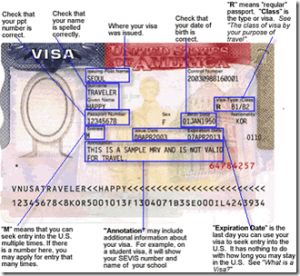There are a few great sources of information answering one or both of the questions on the Internet. However the problem is most sites that address the Green Card tend to be vague, spread complete innaccuracies, raise false hopes and often charge usually excessively for services that should not be charged (eg. the DV or Green Card Lottery).
So I will try and create a brief outline of what the Green Card is and isn’t and what are the main ways you can obtain one.
The Green Card itself is an identification card stating that the holder is entitled to permanent resident status in the US. The major benefits include the right to both live and work anywhere in the US. This differs from all the non-immigrant visas which specify where the applicant must work, study, etc. and generally reside. They also are for much shorter periods of time and do not generally give the right to apply directly for US Citizenship.
The holder must maintain permanent resident status, and can be removed from the US if certain conditions of this status are not met. The Green Card actually does have an expiry date which can be extended simply and easily if all general conditions are met. A common period of validity is 10 years (which of course is far longer than the 3 years periods and limited renewals of H-1B and 2 year periods of E-3).
These general conditions are relatively simple like not committing crimes, submitting fraudulent application documents, paying taxes, etc. so most people never run into an issue here.
While a Green Card Application is pending, an applicant obtain 2 documents;
1.Temporary work permit known as the Employment Authorization Document (EAD), which allows the ability to work.
2. The second is a temporary travel document, advance parole, which allows you to re-enter the US as technically under normal circumstances during this period you are not allowed to leave.
There are 5 ways you can obtain a Green Card or Permanent Residency and these are as follows;
- via a family member
- via employment
- via investment
- via the Diversity or Green Card Lottery
- via “The Registry” provisions of the Immigration and Nationality Act
According to wikipedia these are the current annual limits and wait times for
the various Green Cards
|
Category
|
Eligibility
|
Annual
Quota
|
Backlog
|
| Family-Sponsored |
|
|
|
IR
(A U.S. citizen must be at least 21 years of age in order to sponsor his
or her parents.) |
Immediate
relative (spouses, minor children & parents) of U.S. citizens |
No
Limit |
|
| F1 |
Unmarried
sons and daughters (21 years of age or older) of U.S. citizens |
23,400 |
6-7
years |
| F2A |
Spouses
and minor children (under 21 year old) of lawful permanent residents |
87,934 |
5-6
years |
| F2B |
Unmarried
sons and daughters (21 years of age or older) of lawful permanent residents |
26,266 |
9-10
years |
| F3 |
Married
sons and daughters of U.S. citizens |
23,400 |
8-9
years |
| F4 |
Brothers
and sisters of adult U.S. citizens |
65,000 |
10-11
years |
| Employment-Based |
|
|
|
| EB1 |
Priority
workers. There are three sub-groups:Foreign nationals with extraordinary
ability in sciences, arts, education, business, or athletics OR Foreign
nationals that are outstanding professors or researchers with at least three
years’ experience in teaching or research and who are recognized internationally.
OR Foreign nationals that are managers and executives subject to international
transfer to the United States. |
40,000 |
currently
available |
| EB2 |
Professionals
holding advanced degrees (Ph.D., master’s degree, or at least 5 years of
progressive post-baccalaureate experience) or persons of exceptional ability
in sciences, arts, or business |
40,000 |
currently
available |
| EB3 |
Skilled
workers, professionals, and other workers |
40,000 |
5
years |
| EB4 |
Certain
special immigrants — ministers, religious workers, current or former U.S.
government workers, etc. |
10,000 |
currently
available |
| EB5 |
Investors |
10,000 |
currently
available |
Diversity
Immigrant (Green Card Lottery) |
|
55,000 |
|
Political
Asylum |
|
No
Limit |
|
| Refugee |
|
70,000 |
|
The Application Process has 3 Steps:
1. Application (only with an Investor category would this be done by the person themselves)
2. Avalibility (As the quotas are limited as stated above, even in the application is approved by the USCIS, you still have to wait for a visa number from the National Visa Center. There are additional limitation based on birth country so citizens of India, China, Mexico, etc. tend to have longer wait periods. If this is an Immediate Relative petition
there is no wait time)
3. Ajudication (If done within the US, the form I-485 is require to do an adjustment of status. If done at a consulate or embassy outside the US, then the applicant will receive an I-551 stamp in the passport at the port of entry. In both cases the actual Green Card will be mailed to their US address after several weeks)
A person can apply for US Citizenship after maintaining permanent residency for at least 5 years and can make that application up to 90 days before reaching this date. However this time is shorter for people with political assylum (4 years) and if married to a US citizen (3 years).
To Note:
– There are major tax obligations with being a Permanent Resident and further obligations for a US citizen
– Male Permanent Residents aged between 18-26 are required to register for the Selective Service System (that is should the US Government ever reinstate the military draft for example, you can be called to serve). I hope
this clears up the myths and answers your questions. 🙂
CJ


